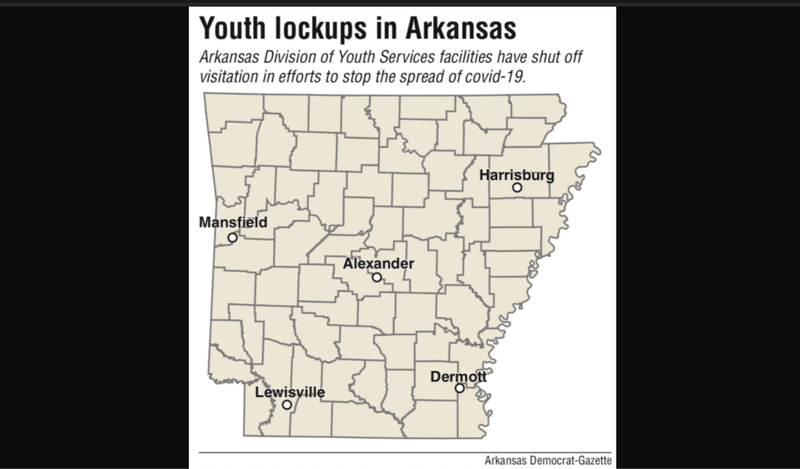Melinda Azlin wants her teenage son home with her to weather the coronavirus outbreak sweeping the country; he's in a youth lockup in Alexander, and he's scared.
"There's a lot of kids that are so scared right now because they're stuck in there, and they know what's going on, but they can't see their parents," Azlin said.
Nationally, advocates and juvenile justice experts are calling for the safe release of as many children in youth lockups as possible because of concerns about the spread of the virus in enclosed facilities where social distancing is nearly impossible.
"If you were to design a place that would magnify the dangers of coronavirus, you could actually hardly do better than youth correctional facilities in America," said Vincent Schiraldi, co-director of the Columbia University Justice Lab, during a press call Wednesday that focused on juvenile justice and covid-19.
The Youth Correctional Leaders for Justice, a group composed of current and former youth corrections workers, released a statement March 19 with a list of recommendations for care of children in state custody, which included releasing those who can be safely treated at home.
Staff members at juvenile detention centers in Connecticut, Georgia and New York have tested positive for covid-19. A prison farm employee in Arkansas also tested positive. California halted new admissions to juvenile facilities, and several other jurisdictions across the country are expediting releases.
Arkansas does not plan to release children early, said Marci Manley, a spokeswoman for the state Department of Human Services. The Division of Youth Services, which oversees the state's five youth lockups, operates under the Human Services Department.
"We are monitoring facility staffing and those youth who are considered low-risk and nearing their anticipated discharge date in light of the public health situation," Manley said in an email.
Over the past year, the division has decreased the number of kids in lockup as part of Gov. Asa Hutchinson's plan to overhaul the juvenile justice system. In July 2017, there were 327 children in the state's facilities. In mid-February, there were 241.
In a statement from the governor's office, spokeswoman Katie Beck said there are no plans for a "mass discharge" of youths.
"DYS is monitoring daily and will discharge low-risk youth when appropriate and public safety is not jeopardized. There are currently no cases of COVID-19 in DYS facilities. If there is an outbreak, we will adjust as needed for the safety of the juveniles," the statement read.
The Arkansas Board of Corrections approved expedited parole consideration for 114 adult inmates last month to reduce overcrowding in light of covid-19.
In addition to ending visitation, the Youth Services Division is screening staff members for covid-19 symptoms, providing hygiene training for residents and staff members, and preparing the facilities for the possibility of isolating residents.
The facilities do not have video-chatting capabilities but are allowing extra phone calls with family members, Manley said.
The inability to see her son -- even through a video camera -- has Azlin particularly worried because she can't check her son for bruises as she normally would.
He's scheduled for a release hearing later this month, and Azlin is concerned that with courts closed for many in-person hearings, the date will be postponed. She said a facility worker told her son that he might not be released until June.
Manley said the division isn't anticipating delays in discharge dates.
"DYS's attorney is working with courts ahead of scheduled court dates to be sure a plan is in place and all the necessary documentation is available," Manley wrote.
Tom Masseau, the executive director of Disability Rights Arkansas, said his group is monitoring the facilities closely and has requested that Rite of Passage and Youth Opportunity LLC, the contracted companies that run the state's five facilities, provide their documentation of plans to keep kids safe.
Rite of Passage runs the Alexander lockup while Youth Opportunity manages the other four.
Rite of Passage has provided its plan, but Youth Opportunity has not, Masseau said.
[CORONAVIRUS: Click here for our complete coverage » arkansasonline.com/coronavirus]
Disability Rights is federally mandated to monitor the treatment of people with disabilities.
Gina Womack, the co-founder and executive director of the advocacy group Families and Friends of Louisiana's Incarcerated Children, compared the situation to Hurricane Katrina, when children were left in lockups in New Orleans.
"[We're] making plans for everyone except the children who are locked behind bars," Womack said during the press call. "They seem to be an afterthought."
NW News on 04/06/2020
